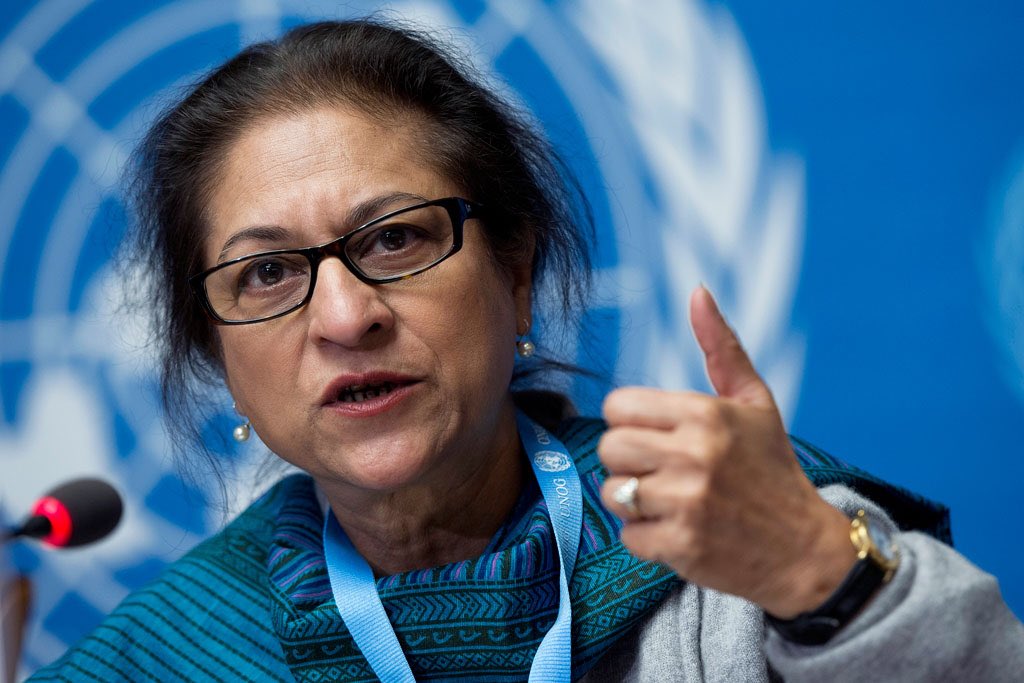Asma Jehangir was nothing short of a superhero for Pakistani women who wanted someone with grit and an indomitable spirit to stand up to “The Man.” Be it the military overstepping its mandate, a popular autocrat’s absolute power or the trampling of minority rights, Jehangir was ever ready to push back against injustice. Last week this lawyer par excellence and Pakistani human rights activist died of a heart attack at just 66-years-old and Pakistan, most especially its women, mourned deeply.
Standing just a hair over five feet tall, she made up for her petite frame with her gutsy voice. With her shoulders back and her duppata falling off to the side as she waved her arms in defiance, she could be found at the frontlines of public protests against the police or army. “Come at me if you dare!” she would shout. Jehangir refused to kowtow to the popular expectations of what it meant to be a Pakistani woman or a Muslim woman. She defined her life on her own terms.
Growing up, I had heard of Jehangir, but her political prowess truly dawned on me in 2005 when during General Pervez Musharraf’s military dictatorship, she organized a race in defiance of a law that banned women from participating in marathons. Jehangir announced she would run to bring attention to violence against women in the country – specifically to the murders of over 1000 women who are killed every year in the name of honor in Pakistan, according to a Human Rights Watch report at the time.
On the day of the marathon, the Punjab police were given clear instructions to teach this rebel a lesson. They manhandled her, yanking Jehangir by the hair and dragging her into a police van. They tore off her shirt in the scuffle and in exposing her bare back to the public, the police officers tried to humiliate Jehangir.
Still, she refused to be shamed. She may not have run that marathon, but she won the race. By the shining a spotlight on women’s rights and minorities’ rights—whether it was through protests, arrests or the cases she took on– like defending rape victims, non-Muslims accused of blasphemy or abused wives fleeing their husbands–Jehangir turned the tide. People began talking about human rights in mainstream forums.
For young females like myself working in the field of Pakistani women’s rights, Asma Jehangir was, and remains, our General. Armed with the law and an acidic but truthful tongue, she possessed both the zero damns given by an older woman and the idealism of a young girl. It was a lethal mix.
To fully understand the obscurantism that Asma Jehangir was up against, one only has to look at what was said after she passed away. Even in death, she roused the ire of Pakistan’s rightwing religious pundits who complained that the women who came to Jehangir’s funeral to pay their respects should have remained at home. That it is improper for women to participate in what they considered a men-only social and religious rite.
Others discredited Jehangir’s power by tossing out a slander that is the last resort of anyone who wants to diminish another’s credibility—that she belonged to the reviled and systematically disenfranchised Ahmadi sect of Muslims.
That so many tried to cast a cloud over Jehangir’s legacy and with such vociferousness, only demonstrates her influence. Fortunately, none of the smear attempts caught on.
What remains is the Nobel Peace Prize for which Jehangir was nominated, the fact that she launched Pakistan’s first all-female law firm and her time as the first female president of Pakistan’s Supreme Court Bar Association.
What I and countless other young Pakistani women remember about Asma Jehangir is that when she walked into a room, her presence tore through the machismo of heads of states, military generals and religious pundits alike.
What we will remember is that Asma Jehangir was fierce and relentless underdog for the downtrodden and for women. The kind of defender Islam demands.
Aisha Sarwari is the co-founder of Women’s Advancement Hub and tweets @AishaFSarwari
Image Credit.





